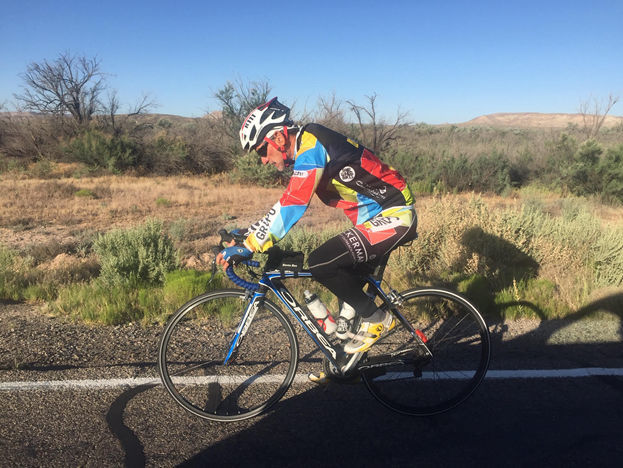Trains don’t stop until they reach their destinations. Sure, they’ll slow down to collect supplies, but they’ll keep going until the job is done.
That’s how Green Valley’s Mark Mandel and cycling partner Ken Shuart describe Race Across America’s (RAAM) two-man relay. The duo will start riding their bicycles on Saturday in Oceanside, California, and finish, eventually, in Annapolis, Maryland.
Riders will travel 3,000 miles and climb 175,000 feet across 12 states in what is nicknamed “The World’s Toughest Bicycle Race.” The route crosses three major mountain ranges (Sierra, Rocky and Appalachian) four of America’s longest rivers (Colorado, Mississippi, Missouri and Ohio) and the Great Plains. Mandel and Shuart hope to finish the race in 8½ days.
When asked why they chose this race, Mandel had a simple answer: “RAAM — it’s the pinnacle. It’s the hardest.”
Shuart agreed.
“I think that’s the other attraction,” Shuart said. “When any kind of race has ‘the hardest in the world’ pinned to it, I’m like, ‘OK, that’s next.’”
Mandel, 63, and Shuart, 60, prepared in different parts of the country. Mandel is a Southern Arizonan, while Shuart lives in Washington, D.C.
The pair connected years ago through their coach Justin Peschka. They first competed together in the 2014 Race Across the West (RAW). Mandel went on to compete in RAW solo a few years after first teaming up with Shuart.
“Then Mark said, ‘Hey, I want to do RAAM. Do you want to join me?’” Shuart said. “I’m like, ‘Mark, there’s better cyclists out there than me.’ But we sort of came to terms and agreed to do it. The rest is history.”
Mandel and Shuart will be helped by a 10-man crew that hails from Indiana, Illinois, Washington D.C. and Arizona. Crew members will work from the team’s van, RV and car while Mandel and Shuart ride.
Mandel and Shuart will take turns riding in 30-to-45-minute intervals. One will be on the bike while the other rider recovers, eats or sleeps in the van. The pair will eat solid foods in the morning and only liquids in the afternoon to help with digestion in high heat.
Because it’s a timed event, every switch-off has to be carefully calculated. The new rider will zoom ahead in the team’s van, and be waiting when for his teammate. The new rider can start when the current rider’s front wheel passes his back wheel. Basically, it’s a baton being passed back and forth across the continental United States.
“The whole idea is the wheels are always turning,” Mandel said. “The cars will stop, but the bikes need to be moving. The crew, with the simulations, that was one of the first things that we communicated with them and they got it real fast. It’s the bikes — get them going. Get them out of the car, get them on the bike and get them going.”
Then there’s the logistical side of the race. The crew must prepare food, wash clothes, anticipate weather patterns and more — all while driving 16 miles per hour to stay on pace with the cyclists.
Mandel’s wife Laura, who has joined him on most of his sporting adventures, will cook meals for the crew. Because of limited space and the amount of food needed to feed a dozen people, Laura will need to deviate from the route to grocery-shop along the way.
“That is the hard part, trying to logistically figure out, ‘OK, I’m just going over here and where am I going to meet you guys? Because they’re going to keep going,’” Laura said. “The RV will keep going. I’ll be in the van, maybe, at that time. So, just trying to figure out where everyone is and hopefully we have connection with our phones and there’s good cell service everywhere. It’ll be interesting.”
The Mandels have been together for 37 years and married for 35. Mark said his wife has been his rock throughout his athletic career.
“I couldn’t do it without Laura,” he said. “There’s a lot that Ken and I can go through, but I lean on her big time.”
After completing the toughest bike race, Mandel said he wants to qualify for the Boston Marathon.
“So I may go back to my triathlon roots and start running again,” he said. “And then the cycling is a great recovery sport for legs when you’re running.”
Last year, Shuart sailed the Atlantic Ocean. Maybe this time, he’ll sail around the world. Or take part in The Great Divide, a self-supported mountain bike race along the Rocky Mountains that starts in Canada and runs about 2,800 miles to the Mexican border.
There’s more. Both men’s bucket lists are long.
“Then other things, like I’d like to go to (Mount) Everest base camp,” Shuart said. “The world is our playground. So you need to go out and find places to play.”





